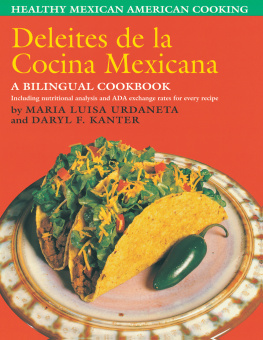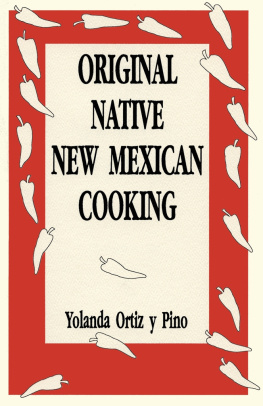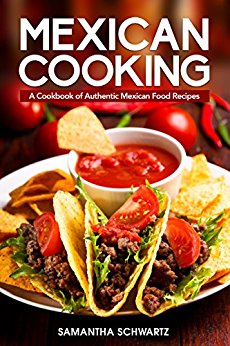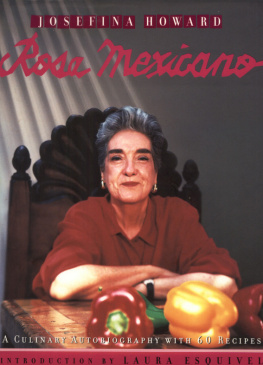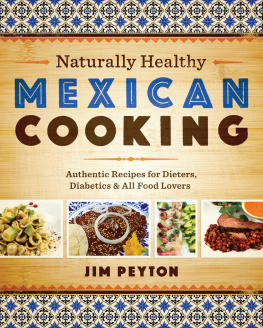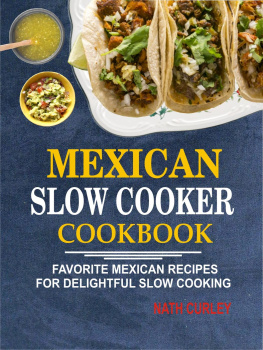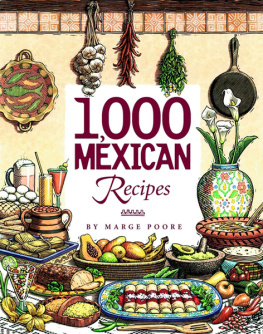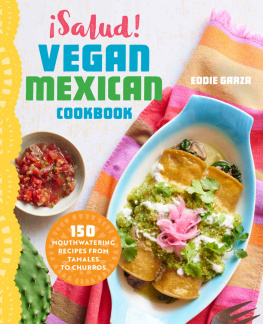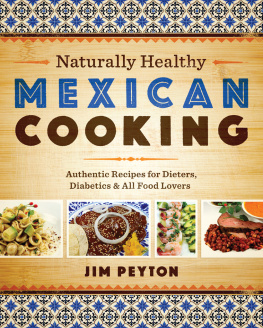Maria Luisa Urdaneta - Deleites de la cocina Mexicana: Healthy Mexican American cooking
Here you can read online Maria Luisa Urdaneta - Deleites de la cocina Mexicana: Healthy Mexican American cooking full text of the book (entire story) in english for free. Download pdf and epub, get meaning, cover and reviews about this ebook. year: 1996, publisher: University of Texas Press, genre: Detective and thriller. Description of the work, (preface) as well as reviews are available. Best literature library LitArk.com created for fans of good reading and offers a wide selection of genres:
Romance novel
Science fiction
Adventure
Detective
Science
History
Home and family
Prose
Art
Politics
Computer
Non-fiction
Religion
Business
Children
Humor
Choose a favorite category and find really read worthwhile books. Enjoy immersion in the world of imagination, feel the emotions of the characters or learn something new for yourself, make an fascinating discovery.
- Book:Deleites de la cocina Mexicana: Healthy Mexican American cooking
- Author:
- Publisher:University of Texas Press
- Genre:
- Year:1996
- Rating:4 / 5
- Favourites:Add to favourites
- Your mark:
- 80
- 1
- 2
- 3
- 4
- 5
Deleites de la cocina Mexicana: Healthy Mexican American cooking: summary, description and annotation
We offer to read an annotation, description, summary or preface (depends on what the author of the book "Deleites de la cocina Mexicana: Healthy Mexican American cooking" wrote himself). If you haven't found the necessary information about the book — write in the comments, we will try to find it.
Flavorful Mexican dishes, modified to be suitable for diabetics.
Deleites de la cocina Mexicana: Healthy Mexican American cooking — read online for free the complete book (whole text) full work
Below is the text of the book, divided by pages. System saving the place of the last page read, allows you to conveniently read the book "Deleites de la cocina Mexicana: Healthy Mexican American cooking" online for free, without having to search again every time where you left off. Put a bookmark, and you can go to the page where you finished reading at any time.
Font size:
Interval:
Bookmark:
Deleites de la Cocina Mexicana Healthy Mexican American Cooking by MARA LUISA URDANETA, PhD, RN, and DARYL F. KANTER, MSHCA, RN  UNIVERSITY OF TEXAS PRESS
UNIVERSITY OF TEXAS PRESS
AUSTIN Copyright 1996 by the University of Texas Press All rights reserved Fifth paperback printing, 2008 Requests for permission to reproduce material from this work should be sent to: Permissions University of Texas Press P.O. Box 7819 Austin, TX 78713-7819 http://utpress.utexas.edu/index.php/rp-form LIBRARY OF CONGRESS CATALOGING-IN-PUBLICATION DATA Urdaneta, Mara Luisa, 1931 Deleites de la cocina Mexicana = Healthy Mexican American cooking / by Mara Luisa Urdaneta and Daryl F. Kanter. p. cm.
English and Spanish. Includes bibliographical references and index. ISBN 978-0-292-78531-1 (paper) 1. DiabetesDiet therapyRecipes. 2. I. I.
Kanter, Daryl F., 1950 . II. Title. III. Title: Healthy Mexican American cooking. ... ...
A mi madre,
Doa Agripina (Pina) Guerrero de Urdaneta, la mejor cocinera que he conocido, y a la comunidad Mxico-Americana.
MLU, San Antonio, Texas y a Rebecca y Rachel Kanter, quienes con tanta generosidad sacrificaron incontables y preciosas horas de vida familiar en apoyo de este extenso y prolongado proyecto.
DFK, San Antonio, Texas El 50 por ciento de los derechos de la autora ha sido alocado para becas para la educacin universitaria de mujeres Mxico-Americanas por medio del Club de Mujeres Mxico-Americanas, Profesionales y de Negocios de San Antonio, Texas. The idea for this book began to take shape in 1990, when I received a letter from Shannon Davies, sponsoring editor of the University of Texas Press, suggesting the need for a volume such as this. I did not realize the magnitude of the task ahead, nor did my co-author, Daryl F. Kanter, who like me is an RN and anthropologist, besides being a gifted coordinator of automated data processing (Nursing Service) at the Audie L. Murphy Division, South Texas Veterans Health Care System. Our thanks go to the many Mexican American home-makers in San Antonio and the Rio Grande Valley who shared their favorite recipes; to our excellent cook and translator, Marcia Ortega; to Dr.
Eleanor Young, nutritionist at the University of Texas Health Science Center at San Antonio, who provided advice, guidance, and access to difficult-to-obtain materials from the World Health Organization during the early stages of this project; to Drs. Joan Cassell and M. Estellie Smith, excellent anthropologists, editors, cooks, and dear friends, for taking time to proofread and critique early drafts; to Pauline C. Keitt and Sally Frantsen, cherished friends and outstanding cooks, for their patience and indulgence in preparing many of these dishes and then giving us their assessment of flavor, texture, color, and presentation; to my sisters, Ins Thomsen, RD, and Cecilia de Guerrero, for their advice and favorite recipes. We also wish to acknowledge the valued assistance of Elisa Balderas de Jimenez, Mary McNair, and Karen Casto, administrative secretaries, Division of Behavioral and Cultural Sciences, University of Texas at San Antonio. And, last, but not least, thanks to the staff of the University of Texas Press.
MLU La idea para este libro comenz a tomar forma en 1990 cuando yo recib una carta de Shannon Davies, editora patrocinadora de la Imprenta de la Universidad de Texas en Austin, haciendo la sugerencia que se necesitaba un libro tal como este. D. F. Kanter, quien tambin es enfermero registrado, antroplogo y coordinador extraordinario del procesamiento de datos (Servicio de Enfermera) en la Divisin Audie L. Murphy, del Sistema de Salud para Veteranos del Sur de Texas, como yo ignorbamos la magnitud del esfuerzo que requerira esta tarea. Agradecemos muy sinceramente a todas las amas de casa en San Antonio y el Valle del Ro Grande que participaron al permitirnos utilizar algunas de sus recetas favoritas; a nuestra excelente cocinera y traductora, Marca Ortega; a la doctora Eleanor Young, nutricionista del Departamento de Ciencias de la Universidad de Texas en San Antonio, quien nos proporcion consejos, gua y acceso a materiales casi imposibles de obtener de la Organizacin Mundial de la Salud durante la etapa inicial de este proyecto; a las doctoras Joan Cassell y M.
Estellie Smith, excelentes antroplogas, editoras, cocineras y queridas amigas, por tomar tiempo para servir de correctoras de pruebas y crticas de los borradores iniciales; a Pauline C. Keitt y Sally Frantsen, queridsimas amigas y cocineras sobresalientes, por su paciencia y cooperacin para preparar muchas de las recetas y luego darnos su opinin en cuanto al sabor, textura, color y presentacin del producto final; a mis hermanas Ins Thomsen, RD, y Cecilia de Guerrero por sus consejos y algunas de sus recetas favoritas. Tambin queremos agradecer la valiosa ayuda de Elisa Balderas de Jimnez, Mary McNair y Karen Casto, secretarias administrativas de la Divisin de Ciencias Sociales y Culturales de la Universidad de Texas en San Antonio. Y, finalmente, pero no por ello de menor importancia, agradecemos a la Imprenta de la Universidad de Texas. MLU Changing Mexican American Eating Habits as Cultural and Culinary Translation Diabetes mellitus is a chronic disease that is of growing concern in the United States, especially among Mexican Americans. The public health authorities have identified more than thirteen million persons with diabetes in the United States (Smolan, Moffitt, and Naythons 1990: 216).
These authorities believe that there is an equal number of cases that have not been diagnosed. The disease is reaching epidemic proportions among Mexican Americans, with an incidence five times that in the general population (in other words, five of one hundred Anglo Americans will develop diabetes as opposed to twenty-five of one hundred Mexican Americans). Diabetes mellitus occurs when the body cannot use glucose (a form of sugar) efficiently. The classic triad of symptoms is increased thirst, increased hunger, and increased urination; these are accompanied by highly elevated blood glucose levels. Insulin, a hormone produced by the pancreas, is the catalyst that allows the most efficient use of glucose as a source of energy. Type I (insulin-dependent) diabetes occurs when the pancreas makes little or no insulin.
Treatment includes injections of insulin to help the body use glucose. Type II (non-insulin-dependent) diabetes occurs when the body has difficulty using the insulin the pancreas makes. Type II symptoms include blurred vision, tingling or numbness in the feet or hands, frequent skin infections or itchy skin, slow-healing cuts or bruises, drowsiness, and fasting hyperglycemia (elevated blood sugar levels following an eight to twelve hour fast). The onset of Type II diabetes symptoms tends to occur after age forty; the major complication is narrowing of the blood vessels caused by fat deposits. This narrowing of the blood vessels can lead to retinal damage, kidney damage, and complete or partial amputation of a limb, usually a leg. Direct costs of diabetes treatment programs are high, averaging more than two hundred dollars per patient per day.
Indirect costs associated with lost work and school time and low levels of personal productivity make the expenses even more burdensome. Costs are so high because persons with diabetes are twenty-five times more likely than nondiabetics to lose their sight, seventeen times more likely to have kidney disease, five times more likely to suffer amputation of the lower extremities, and two times more likely to have heart disease. Persons with diabetes can expect to live only about two-thirds as long as nondiabetics. Type I diabetes accounts for approximately 12 percent of cases; Type II, 85 percent (the other types of diabetes combine to make up the remaining 3 percent). Mexican Americans overwhelmingly fall into the Type II group. Among the factors that place Mexican Americans at high risk for Type II diabetes are obesity, heredity, diet, stress, and decreased physical activity.
Next pageFont size:
Interval:
Bookmark:
Similar books «Deleites de la cocina Mexicana: Healthy Mexican American cooking»
Look at similar books to Deleites de la cocina Mexicana: Healthy Mexican American cooking. We have selected literature similar in name and meaning in the hope of providing readers with more options to find new, interesting, not yet read works.
Discussion, reviews of the book Deleites de la cocina Mexicana: Healthy Mexican American cooking and just readers' own opinions. Leave your comments, write what you think about the work, its meaning or the main characters. Specify what exactly you liked and what you didn't like, and why you think so.

